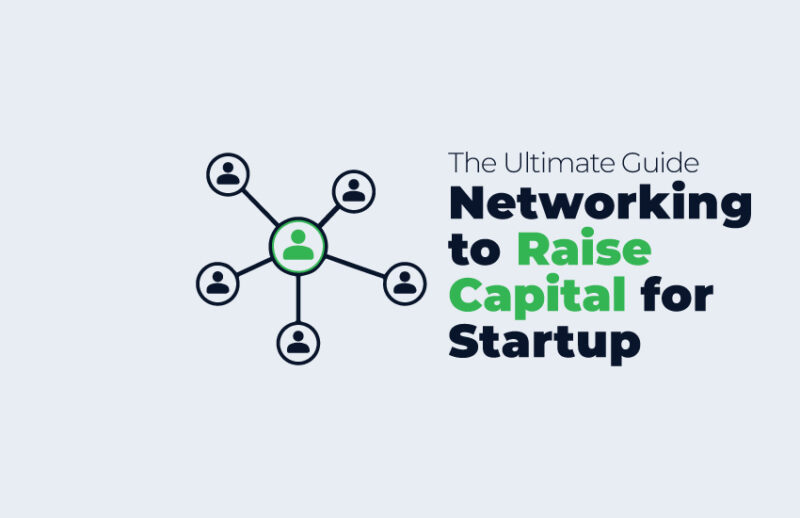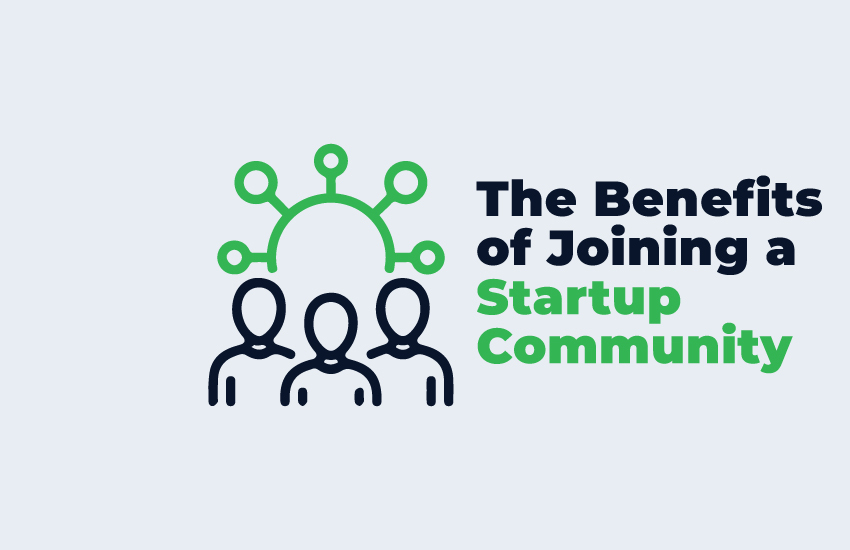How Networking Like a Ninja Helps Raise Capital For Your Startup: The Ultimate Guide

Starting a business is tough, and for founders, it can be a particularly daunting task. But can you imagine not having a valuable network along the way? Not having a network can have far-reaching adverse effects on a founder’s ability to access funding and resources to receive advice and guidance from experienced professionals.
One of the most significant drawbacks of not having a network is the missed opportunities. Without a network, founders may not hear about important events, partnerships, or funding opportunities. They may also struggle to connect with potential customers, suppliers, and investors. Take, for example, the case of Blockbuster. Once the dominant player in the video rental market, Blockbuster failed to adapt to the changing landscape of streaming services and online rentals. Part of the reason for their downfall was their lack of a network—they were slow to adapt to new technologies and failed to make connections with startups that could have helped them stay relevant.
Not having a network can also have a significant impact on a founder’s ability to raise funds for their startup. Without a network, founders may not have access to potential investors. In many cases, investors prefer to invest in startups that have been recommended or introduced to them through their network. Founders who lack a network may struggle to connect with investors who are a good fit for their startup.
Moreover, without a network, founders may miss out on critical advice and feedback from experienced investors. Many investors bring valuable insights, connections, and experience to the table, which can help founders to refine their business strategy and navigate challenges. Without access to this support, founders may struggle to make informed decisions about their business and miss out on opportunities to grow and improve. For example, in 2010, the mobile payment startup Square struggled to secure funding in the early days. However, co-founder Jack Dorsey was able to leverage his network and connections to secure funding from prominent investors, including Khosla Ventures and Sequoia Capital. This early investment was instrumental in the company’s success, which is now valued at over $100 billion.
- Why Networking Should Be Your First Step in Fundraising
- Building Relationships with Investors
- Identifying Potential Investors
- Demonstrating Validation to Investors
- Developing a Strong Reputation in the Industry
- Navigating the Fundraising Round through Strategic Networking
- Raising Funds Beyond Round One: Networking After Fundraising
- Stress-Free Fundraising: Outsource Your Networking Today
- Conclusion
- Summary
- FAQs
Why Networking Should Be Your First Step in Fundraising
Networking is a critical component of the fundraising process, particularly for startups. Establishing relationships with potential investors through global investor networks, demonstrating the potential of your business, and building a strong reputation in the industry are all key benefits of networking before raising funds, which raise the chance of being on the top of mind in social networks for investors. In this section, we’ll explore why networking is important and what you can do to make the most of it.
Building Relationships with Investors
One of the main benefits of networking before raising funds is building relationships with potential investors. By getting to know investors and understanding their needs and goals, you can establish trust and credibility with them, making it easier to secure funding when the time comes. Building strong relationships with investors is also important because it can help you better understand their investment strategies and what they look for in a startup. This information can be invaluable when it comes time to pitch your business.
Identifying Potential Investors
Identifying potential investors is another key component of networking. Before you begin networking, it’s important to do your research. This includes learning about investors and their investment strategies, as well as what types of startups they are interested in funding. There are many online tools and resources available that can help you find potential investors, so be sure to utilize these resources to your advantage.
Attending networking events and conferences is another great way to meet potential investors and other industry professionals. These events provide an opportunity to make new connections and build relationships with investors who may be interested in funding your startup. Even in the age of virtual networking, attending virtual events and conferences can be a valuable tool in your fundraising arsenal.
Demonstrating Validation to Investors
Networking before raising funds allows you to demonstrate the potential of your business to investors. Showcasing your product or service and sharing customer feedback and traction metrics can help you validate your business idea and build investor confidence. Additionally, presenting a winning business plan can demonstrate the viability of your business and increase investor confidence in your ability to execute your plan. Crypto investor networks and impact investing networks are the most prominent networks for some industries currently in a state of Hype.
Developing a Strong Reputation in the Industry
Finally, networking can help you develop a strong reputation in the industry. Building relationships with industry leaders and participating in industry discussions and debates can help you establish yourself as a thought leader in your field. This can increase the visibility of your business and make it easier to secure funding from investors who are familiar with your work. By establishing yourself as an expert in your area of expertise, you can demonstrate your expertise and increase the likelihood that investors will take your business seriously.
Navigating the Fundraising Round through Strategic Networking
Maintaining and strengthening relationships is key during the fundraising round. This period can be a crucial time for securing investment and ensuring the success of your startup. Here are some tips to help you network effectively during this stage:
Keep Your Network Informed
Regular communication with your network is crucial during the fundraising round. By keeping them informed of your progress and updates, you help to maintain their interest and investment in your success. Consider sending out regular email updates, hosting informational calls, or even hosting a networking event to celebrate your progress.
Leverage Your Investors
Your current investors can be a valuable resource during the fundraising round. Encourage them to provide introductions to potential investors and offer their own insights on the fundraising process. Not only will this expand your network, but it also helps to establish credibility and trust with new investors.
Attend Industry Events
Attending industry events is a great way to connect with potential investors, customers, and partners. These events offer opportunities to showcase your startup, learn about the latest trends and opportunities in your industry, and build meaningful relationships. Be sure to research events that cater to your specific industry and target audience, and be prepared to make a strong impression.
Utilise Social Media
Social media platforms can be a powerful tool for networking during the fundraising round. Use platforms like LinkedIn, Twitter, and Facebook to share updates, connect with potential investors, and build a community around your startup. Consider creating a company page or group to share information and connect with others in your industry.
Ask for Referrals
Don’t hesitate to ask your network for referrals to potential investors. This can be a great way to expand your reach and connect with new potential investors. Consider offering incentives, such as a referral fee, to those who successfully refer new investors to your startup. By following these tips, you can continue to build relationships and network effectively during the fundraising round. Strong relationships with investors and other industry players can make all the difference in securing investment and ensuring the success of your startup.
Raising Funds Beyond Round One: Networking After Fundraising
After raising funds, the work is not over for startup founders. Networking continues to play a vital role in the success and growth of the startup. In this section, we will explore the various ways in which founders can utilize their networks after fundraising.
Maintaining Relationships with Investors
Investors can play a significant role in the success of a startup long after the initial investment has been made. That is why it is important to keep in touch with investors and keep them engaged. This can involve regular updates, event invitations, and check-ins to ensure their needs are met. By maintaining strong relationships with investors, founders can create a supportive network that can provide future funding opportunities, valuable advice, and industry connections.
Building a Strong Professional Network
Building a professional network is crucial for the long-term success of a startup. By expanding their network after fundraising, founders can tap into new resources, opportunities, and expertise. Best practices for growing and maintaining a professional network include attending industry events, reaching out to potential connections, and staying in touch with past colleagues and peers.
Utilizing Your Network for Future Fundraising
The network of relationships a founder has built can also be leveraged for future fundraising rounds. Utilizing your network for fundraising requires careful planning and execution. To ensure success, founders should keep their network engaged, create opportunities for them to provide support, and clearly communicate the value of their business.
Collaborating with Other Startups and Industry Leaders
Collaborating with other startups and industry leaders can provide valuable opportunities for learning and growth. By identifying potential collaborators and building relationships, founders can tap into new resources, learn from industry experts, and gain valuable exposure. Building a network of peers and mentors can also provide a supportive community to help founders overcome challenges and succeed.
Staying Connected with Your Network
Staying connected with your network is crucial for maintaining strong relationships and ensuring continued success. Best practices for maintaining strong relationships with your network include regularly reaching out, providing valuable content and resources, and staying in touch. By keeping their network engaged and active, founders can continue to benefit from their network long after the fundraising round has ended.
Networking plays a crucial role in the success of a startup, both before, during, and after the fundraising round. Using the tips and strategies outlined in this guide, founders can build strong relationships, secure additional funding, and achieve long-term success. And if founders find that networking is not their strong suit, they can always outsource it to a professional networking company like Easy Capraise.
Stress-Free Fundraising: Outsource Your Networking Today
In this section, we will explore the benefits of outsourcing your networking efforts as a startup founder.
More Time for Core Responsibilities
One of the biggest advantages of outsourcing your networking is that it frees up your time to focus on your core responsibilities. As a startup founder, your time is limited and valuable, and outsourcing networking allows you to allocate it towards tasks that are more critical to the success of your business.
Access to Professional Networking Expertise
When you outsource your networking, you have access to professional networking experts with the skills, knowledge, and experience to help you build and maintain strong relationships with investors and other key connections. These experts have a deep understanding of the industry and know the right people to connect with to help you achieve your fundraising goals.
Expanded Network
Another benefit of outsourcing your networking is having access to a larger network of connections. Your networking service provider has the resources and connections to expand your network and introduce you to new investors and other key connections that you may
not have been able to reach on your own.
Improved Networking Techniques
Outsourcing your networking also means that you have access to the latest and most effective networking techniques and strategies. Your networking service provider is constantly learning and evolving their approach to ensure that they provide the best possible service to its clients. By outsourcing your networking, you can benefit from these new techniques and strategies and improve your own networking skills. As a startup founder, raising funds can be a challenging and time-consuming task. While networking is crucial to success in fundraising, it can also be a significant source of stress and distraction. That’s where outsourcing your networking efforts can be a game-changer.
By working with a professional fundraising service, you can streamline your networking efforts and gain access to a wealth of expertise and experience. One of the key benefits of outsourcing your networking efforts is the reduced stress and increased efficiency of having a professional handle these crucial tasks for you.
Easy Capraise’s Secret Sauce for Networking
Networking is a vital aspect of fundraising for startups. It is an opportunity to connect with potential investors, industry experts, and other key players in your field. By building strong relationships and making a lasting impression on these individuals, you increase your chances of securing funding and finding success in your venture. Here, we’ll share the secret sauce of networking for startups and provide tips on how you can use it to your advantage.
Making a Lasting Impression on Investors
The first step in building a successful network is making a lasting impression on investors. This involves showcasing your skills, sharing your vision, and being personable. To make a lasting impression, be prepared to discuss your business in detail, provide relevant and compelling information about your market and competition, and be confident and enthusiastic about your product or service. Additionally, make sure to follow up with investors after your initial meeting and keep them informed about your progress.
Building Strong, Long-Term Relationships
Networking is not a one-time event. It requires ongoing effort and commitment. To build strong, long-term relationships with investors and other key players, you need to provide value to them. This can include sharing valuable industry insights, introducing other players in your network, or simply being a sounding board for their ideas. Building relationships with investors and industry experts can be time-consuming. Still, it is well worth the effort, as these relationships can be invaluable in securing funding and finding success in your venture.
Continuously Improving Your Networking Skills
Networking is an ongoing process, and it’s important to improve your skills and knowledge continually. Attend events, conferences, and workshops in your industry, and make a point of connecting with other attendees. Read books, articles, and blog posts about networking and fundraising, and consider hiring a professional coach or mentor to help you improve your skills. The more you put into networking, the more you will get out of it, and the greater your chances of securing funding and finding success in your venture. By using these tips and continuously improving your networking skills, you’ll be well on your way to securing funding and finding success in your venture. Remember, networking is a long-term commitment, and the more you put into it, the more you will get out of it.
Conclusion
In conclusion, networking is an essential component of a successful fundraising journey for startups. Networking before, during, and after a fundraising round is crucial in building strong relationships with investors and providing value to them. By outsourcing networking, startups can free up their time to focus on other critical aspects of their business while also benefiting from a more professional and effective approach.
Success stories of startups using outsourcing networking for their fundraising efforts testify to its efficacy. These startups have seen improved results and have reached their fundraising goals faster. If you’re a startup founder looking to raise funds, consider outsourcing your networking to a professional service. By doing so, you can focus on other areas of your business while your networking is handled by experts.
Our fundraising service offers a range of services designed to help you achieve your fundraising goals, from connecting with investors to setting up meetings and following up with leads. Our team of experts has extensive experience in networking and fundraising, and we are dedicated to helping our clients succeed.
Our service handles all the heavy lifting, allowing you to focus on running your business and developing your product. We have a proven track record of success, and our clients consistently report that working with us has been a transformative experience. We have helped countless startups like yours raise the funds they need to succeed, and we would love to help you do the same. Our team is dedicated to providing the highest quality service, and we are always available to answer your questions and provide support. If you’re ready to take your fundraising efforts to the next level, we encourage you to contact us for a consultation. Together, we can help you achieve your goals and make your fundraising journey successful.
Contact us today to learn more about our networking services and how we can help you achieve your fundraising goals.
Summary
Networking with investors before, during, and after fundraising is crucial for entrepreneurs because it helps them establish a relationship of trust, gain insights, and obtain funding. Outsourcing networking to experts can be invaluable, as it frees up time, provides access to a wider network, and increases the chances of finding the right investors. Maintaining these relationships after fundraising is also essential for future funding and business growth opportunities.
FAQs
Why is networking with investors important before fundraising?
Networking with investors before fundraising is important, as it helps entrepreneurs to establish a relationship of trust with potential investors, learn about the investors’ investment criteria and preferences, and receive valuable feedback on their business plans and pitch. This information can help entrepreneurs tailor their pitch to investors’ interests and increase their chances of obtaining funding.
Why is networking with investors important during fundraising?
Networking with investors during fundraising is important because it provides entrepreneurs with access to a wider pool of potential investors, including angel investors, venture capitalists, and private equity firms. This increases the chances of finding the right investors who align with the company’s mission and goals, as well as securing the necessary funding
to grow the business.
Why is networking with investors important after fundraising?
Networking with investors after fundraising is important for maintaining the relationship and securing future funding. This involves keeping investors informed about the company’s progress, seeking their advice and guidance, and building a relationship of trust that can lead to additional funding opportunities in the future.
How can outsourcing networking be valuable for entrepreneurs?
Outsourcing networking can be valuable for entrepreneurs because it frees up time and resources that can be better spent on other critical aspects of the business, such as product development and operations. Outsourcing also provides access to a wider network of investors and industry experts, which can increase the chances of finding the right investors and obtaining funding.
Who can entrepreneurs outsource networking to?
Entrepreneurs can outsource networking to a variety of professionals, including investment bankers, business brokers, and investor relations firms. These professionals have established relationships with investors and can help entrepreneurs identify potential investors, make introductions, and provide valuable guidance on fundraising strategies.
Contact us
Good to have you here! If you have any queries, please leave your message. Our team will reach out soon:)
.



